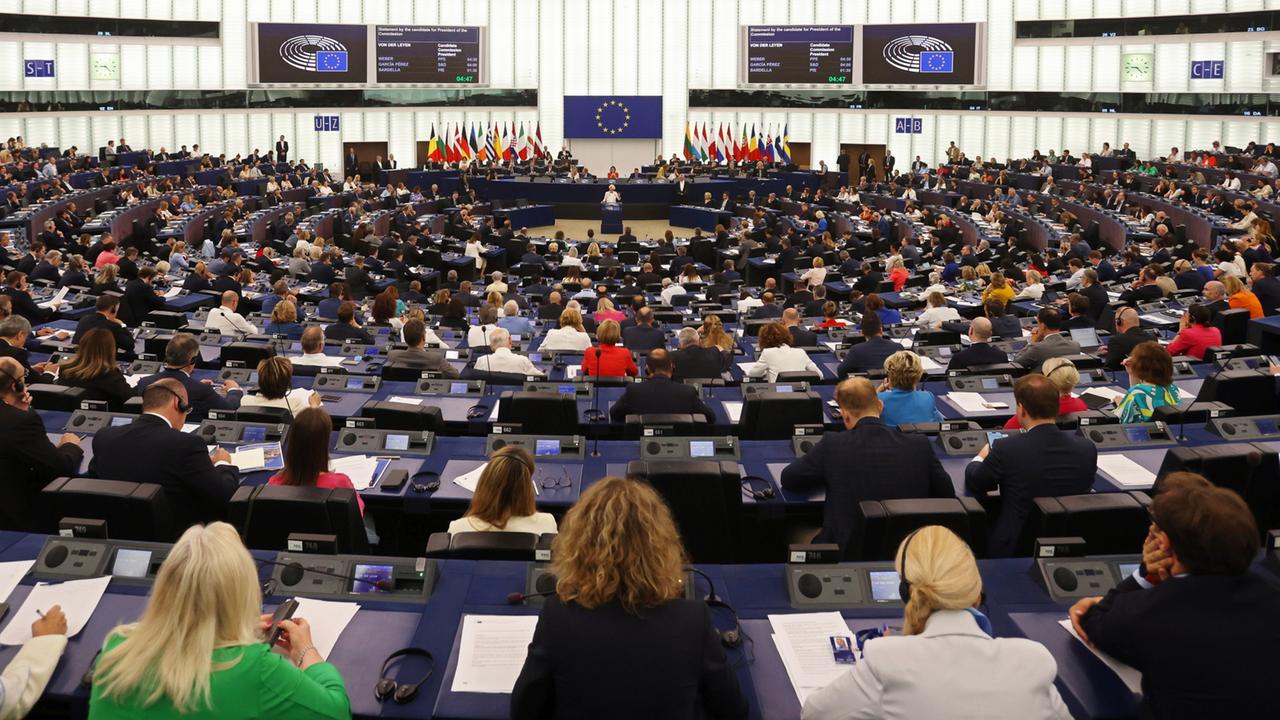Are Europe's Christian Democrats cozying up to the right-wing factions? Critics of Manfred Weber's EPP accuse this and fear far-reaching consequences for the work in the EU Parliament.
This plenary week in the European Parliament in Strasbourg could have an impact: On Wednesday, the MPs decided on their position for the negotiations with the member states on the EU budget for the coming year. They also voted on a declaration of intent that will explain what the money will be used for. The Christian Democratic EPP group, which includes MEPs from the CDU and CSU, voted for the first time in favor of an AfD parliamentarian's amendment.
It calls for “adequate financing of physical barriers at the Union’s external borders”. This motion and another supporting deportation camps received a majority with the EPP's votes, although the accompanying budget resolution ultimately failed overall. The responsible AfD MP Alexander Jungbluth speaks of a “historic day” and a “huge success”.
Does the agreement still apply?
In terms of content, his proposal requires little that is new – it essentially corresponds to the demands of the most recent EU summit. It is noteworthy that the Christian Democrats voted together with the far-right factions. The Greens speak of a breach of the dam and accuse the CDU/CSU parties of making common cause with the European AfD despite all the scruples in Germany.
The European Social Democrats are also angry. According to their interpretation, the Christian Democrats are violating the decades-long agreement between the pro-European factions in the EU Parliament to exclude right-wing populists and right-wing extremists from legislation and other important votes. This clear demarcation is referred to as a dam, firewall or cordon sanitaire, which, in the opinion of Social Democrats, Liberals and Greens, is now becoming full of holes due to the EPP's voting behavior.
Not the first time
And it has been for a long time: a month ago, the EPP voted with the right-wing factions for a resolution in favor of the opposition presidential candidate in Venezuela. To do this, the Christian Democrats adopted a draft from the right-wing extremist “Patriots for Europe”, in which Rassemblement National, FPÖ and Fidesz are represented. Further yes votes came from the right-wing populist EKR – which includes the Polish PiS and the Fratelli d'Italia – and from the “Europe of Sovereign Nations” around the AfD.
Christian Democrats and the right also pulled together on the schedule for the hearings of the designated EU Commissioners at the beginning of next month in the relevant committees of the EU Parliament. With their majority, they ensured that the controversial candidate Raffaele Fitto from the Fratelli d'Italia came ahead of the Social Democrat Teresa Ribera, which could give the former an advantage.
The dissatisfaction of the Social Democrats, Greens and Liberals also stems from the fact that in July the majority of them voted for a second term in office for Commission President Ursula von der Leyen – unlike the Fratelli d'Italia, whose candidate Fitto the EPP was now campaigning for.
New Majority relationships
The Greens believe that the EPP's behavior endangers stability in Europe because it threatens to permanently split the pro-European majority in the EU Parliament. The Social Democrats see the firewall in danger.
EPP group leader Manfred Weber counters: There is still no cooperation with radicals who do not stand up for Europe, Ukraine and the rule of law. Weber argues from a position of newfound strength: The EPP represents 12 of the 27 EU heads of state and government with whom the party and parliamentary group leader regularly consults.
In addition, the result of the European elections in June puts the Christian Democratic group in a comfortable position: Because the majority in parliament has changed, a majority to the left of it is no longer possible to enforce decisions against the Christian Democrats.
Tense mood before the hearings
The exciting question is how group leader Weber uses this power when the actual substantive work begins in Parliament and on which side he looks for the necessary majorities – for example in the vote on the de facto end of the internal combustion engine from 2035, which the EPP is reversing want to do.
The mood in the pro-European groups is tense and this could overshadow the upcoming hearings of the Commissioner candidates. Some of them are considered shaky candidates anyway. If the Social Democrats, Greens and Liberals reject an EPP candidate or the EKR man Fitto, the Christian Democrats could in turn block candidates. The political dynamics of grilling the candidates are becoming even more unpredictable.





